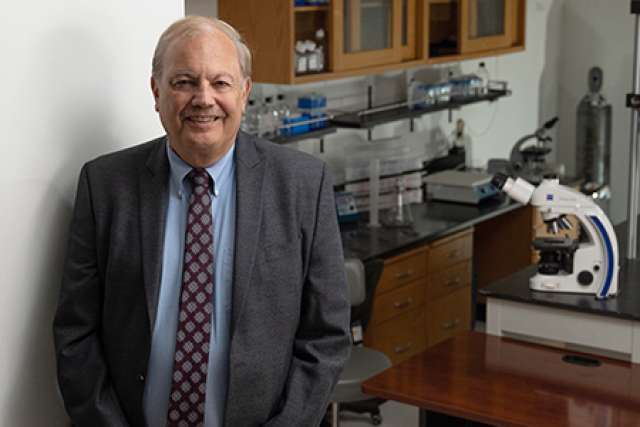Dr. Dennis Slamon, whose basic and clinical research led to the development of a new targeted therapy for breast cancer, has been awarded the prestigious Scheele Award in honor of his work.
Named for the world-renowned Swedish chemist Carl Wilhelm Scheele, the award is given by the Swedish Academy of Pharmaceutical Sciences to prominent and internationally renowned scientists in the field of drug research. Slamon was honored for his clinical work to development Herceptin, which academy officials called “a significant step on the road to personalized medicine.”
Slamon, director of clinical/translational research at UCLA’s Jonsson Comprehensive Cancer Center, received the award and delivered a special lecture today at a ceremony in Stockholm, Sweden.
For more than 12 years, Slamon and his colleagues conducted the laboratory and clinical research that led to the development of Herceptin, which targets a genetic alteration called HER-2 found in about 20 percent of breast cancer patients, or more than 200,000 women worldwide every year.
Herceptin, approved by the U.S. Food & Drug Administration in September 1998, was the first in a wave of new treatments that attempted to fix what was “broken” in a cancer cell — homing in on the genetic mutations causing the cells to become malignant and targeting those alterations. Because it targets only the cancerous cells, Herceptin doesn’t cause the harsh side effects such as hair loss and nausea that often accompany conventional therapies. Herceptin’s approval represented a significant paradigm shift in the way oncologists thought about treating breast and other cancers.
“The one-size-fits-all approach for the major cancers, including and especially for breast cancer, was not as effective as it could have been,” said Slamon, who has received more than two dozen national and international research awards for his work to develop Herceptin. “What we’ve been doing at UCLA is trying to design therapies very specifically for what’s driving the cancer and develop something that is more effective and less toxic.”
In the 11 years since its approval, Herceptin has been tested in breast cancer clinical trials with different chemotherapy combinations. In two studies, one pairing Herceptin with the angiogenesis inhibitor Avastin and one combining it with an inhibitor of the Epidermal Growth Factor Receptor, Tarceva, the chemotherapy was removed from the mix entirely. And Herceptin is currently being tested in a large international trial paired with chemotherapy and Avastin.
Additionally, plans are underway to test Herceptin in gastric cancers that have the same HER-2 genetic mutation found in the breast cancer patients. That trial will be based on pre-clinical work done in Jonsson Cancer Center labs.
In the early stage breast cancer trials, Herceptin paired with chemotherapy significantly increased disease-free survival time. The study also tested Herceptin with a chemotherapy combination that eliminated Adriamycin, an anthracycline commonly used to treat breast cancer but a drug that, when used with Herceptin, can result in heart damage. That regimen also significantly improved disease-free survival.
Slamon also serves as director of the Revlon/UCLA Women’s Cancer Research Program. He is a professor of medicine, chief of the hematology/oncology division and executive vice chair for research for the UCLA Department of Medicine. Slamon also serves as director of the medical advisory board for the National Colorectal Cancer Research Alliance, a fund-raising organization that promotes advances in colorectal cancer.
Cancer Researcher Receives Prestigious Scheele Award

Senior author Dr. Dennis Slamon says "there is absolutely no reason to wait" to give women treatment that combines ribociclib with hormone therapy.
Related Content
Articles:
Services:
Physician
Share:



